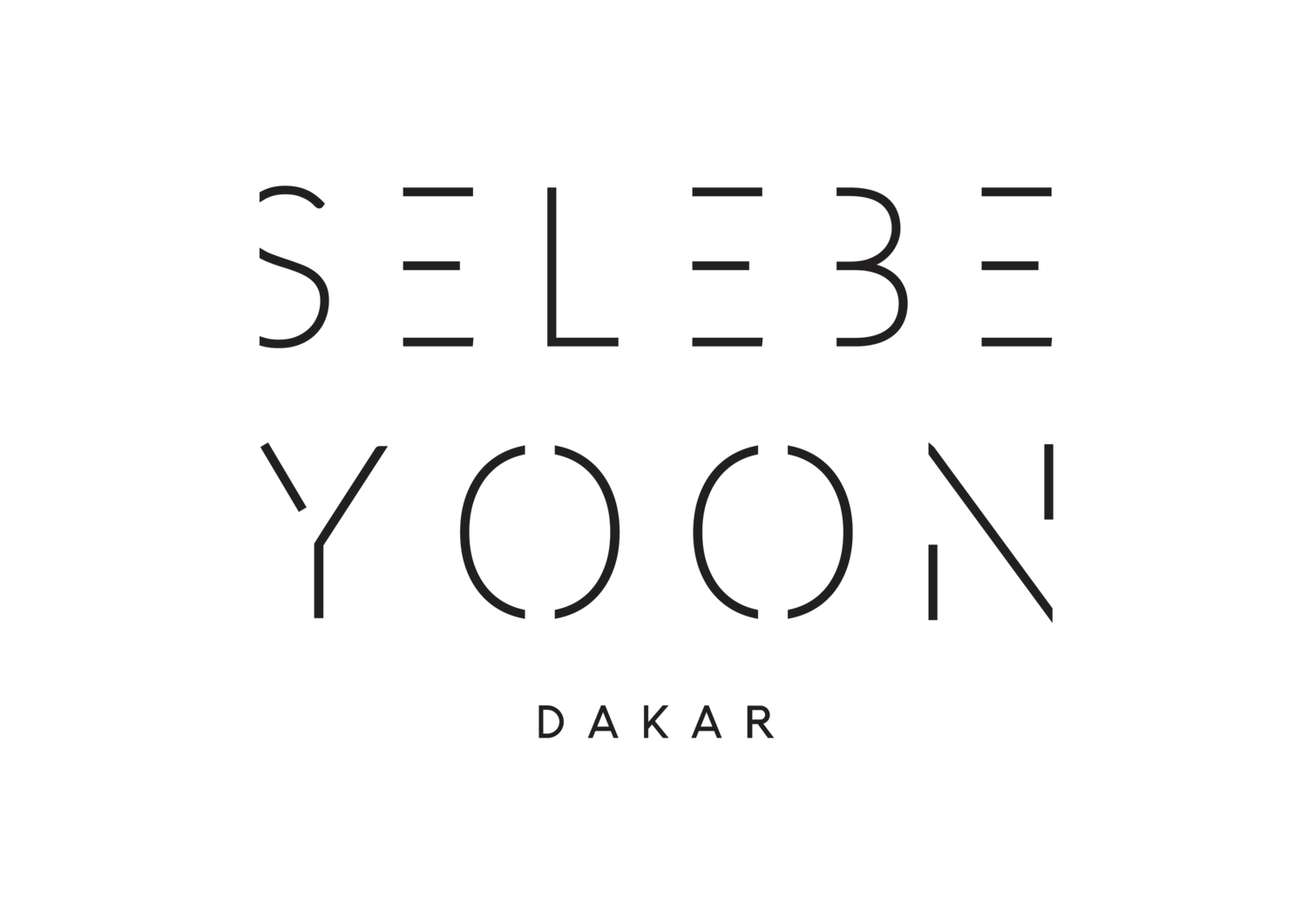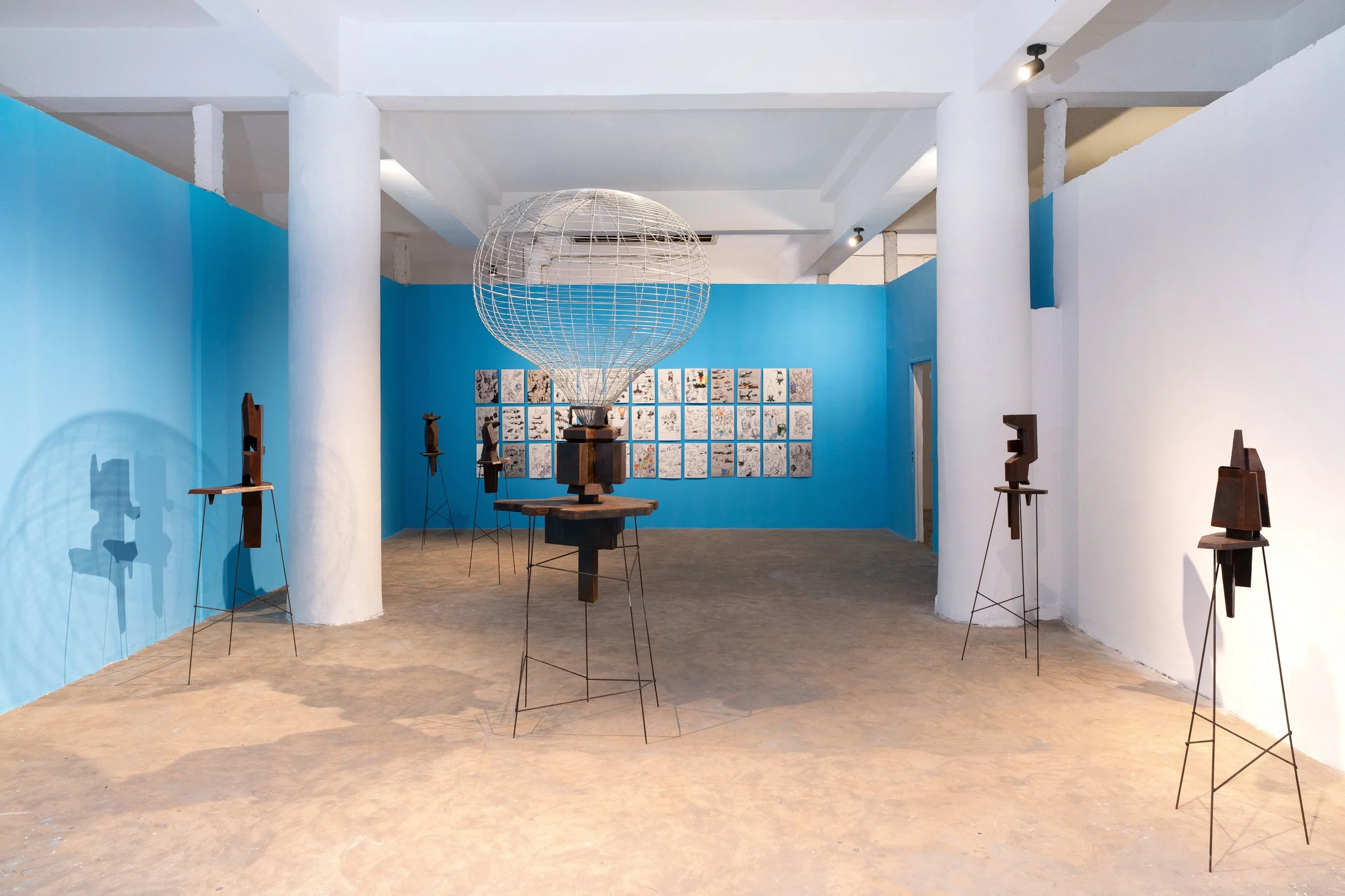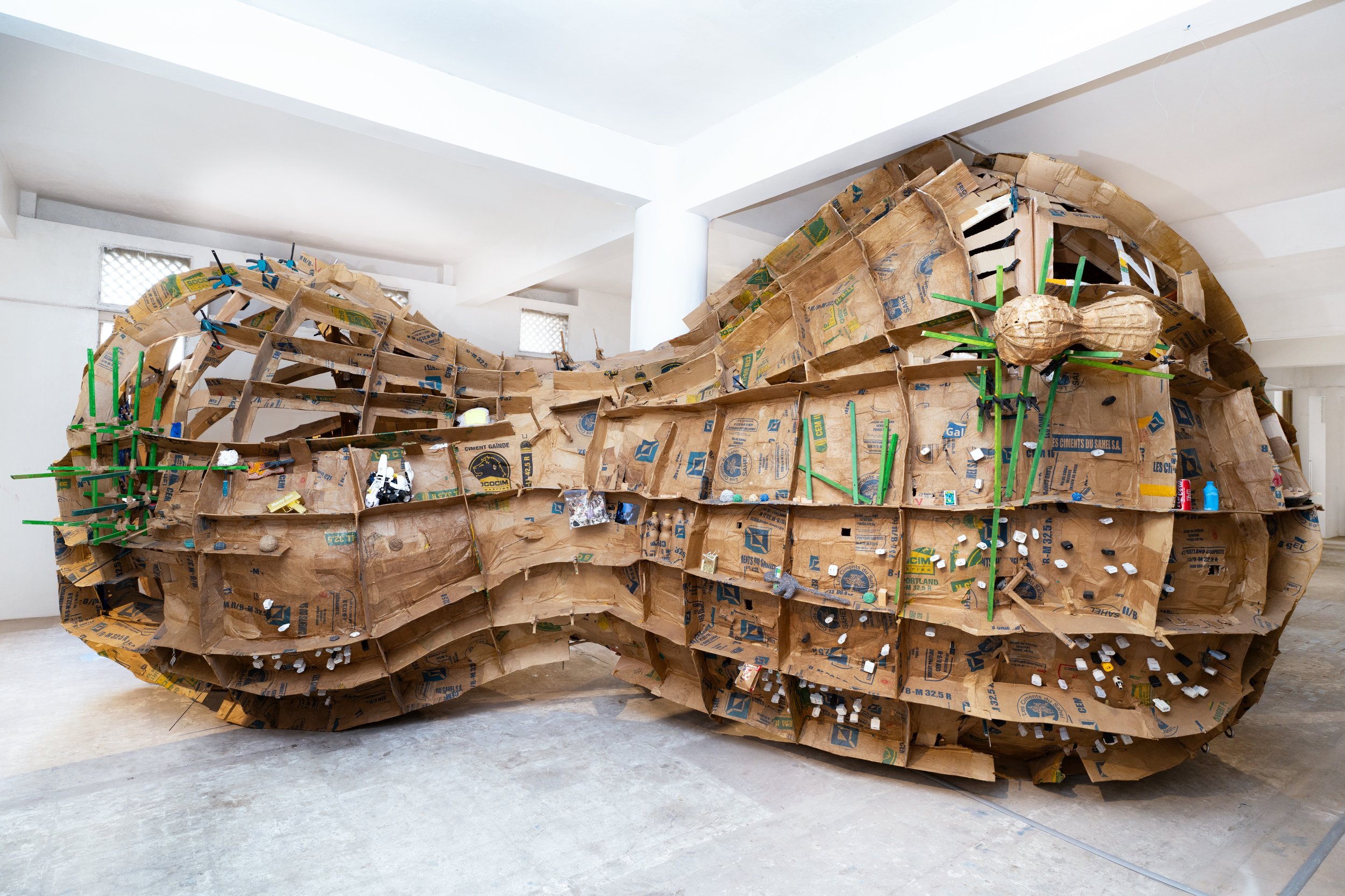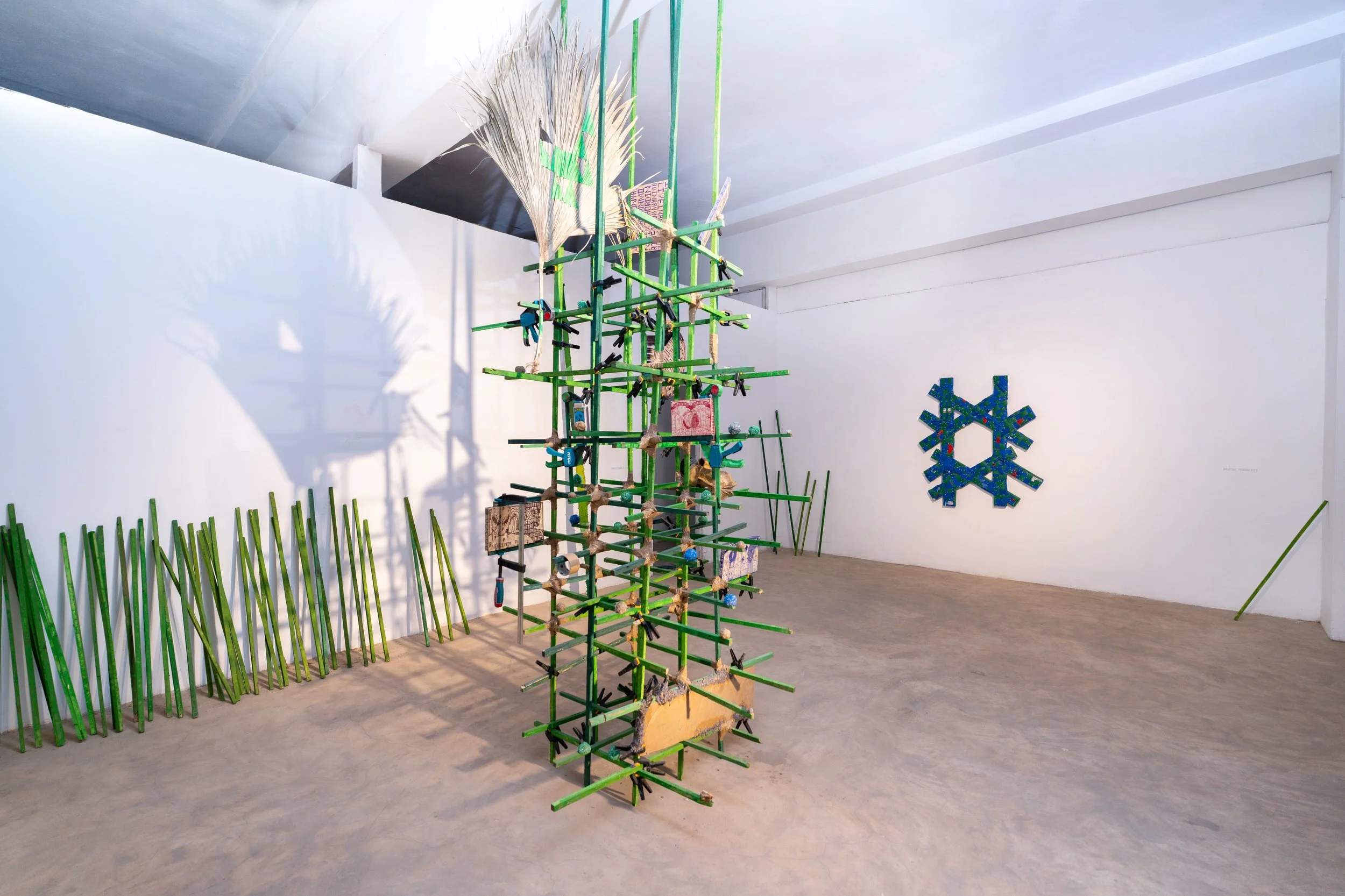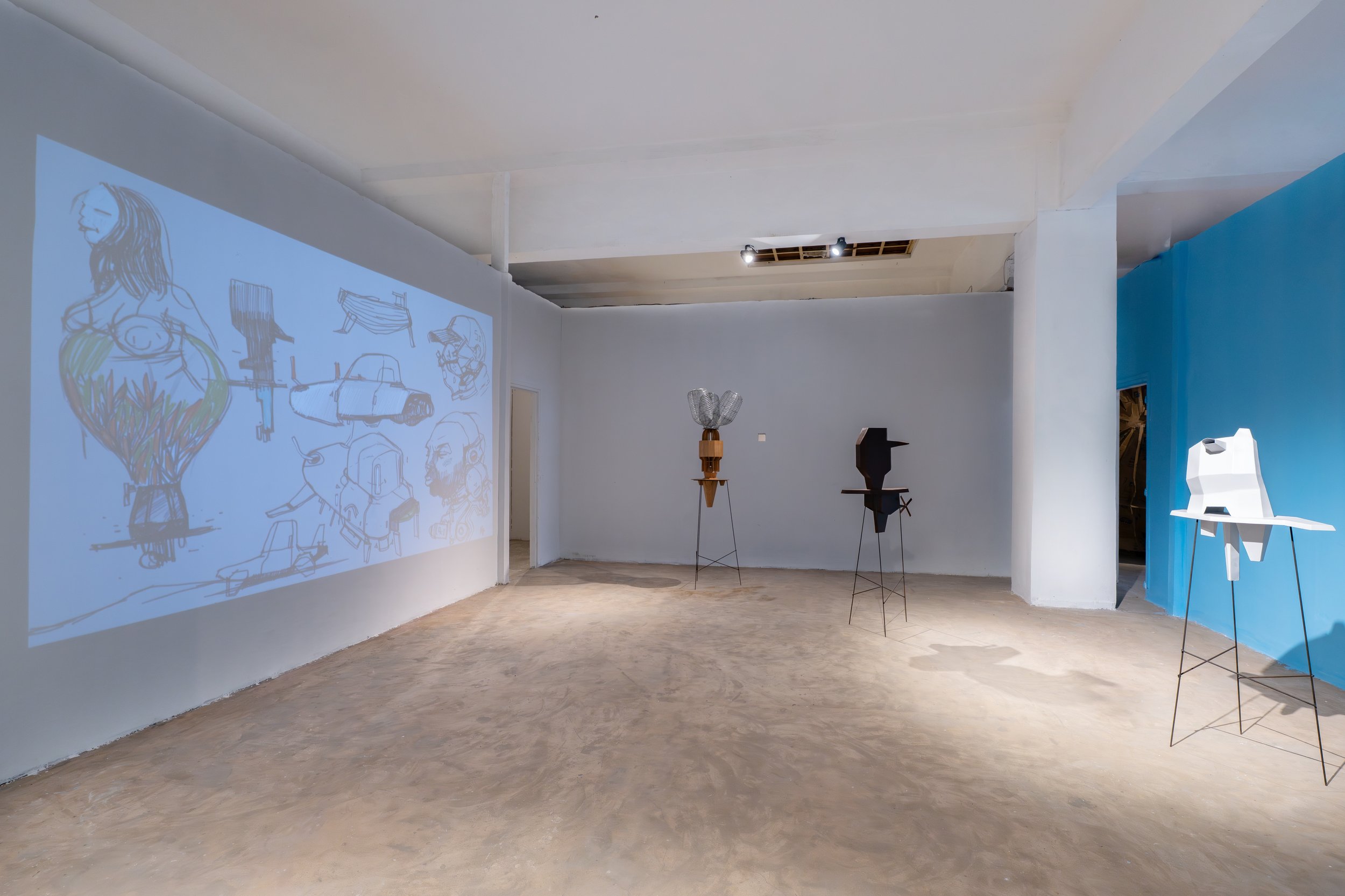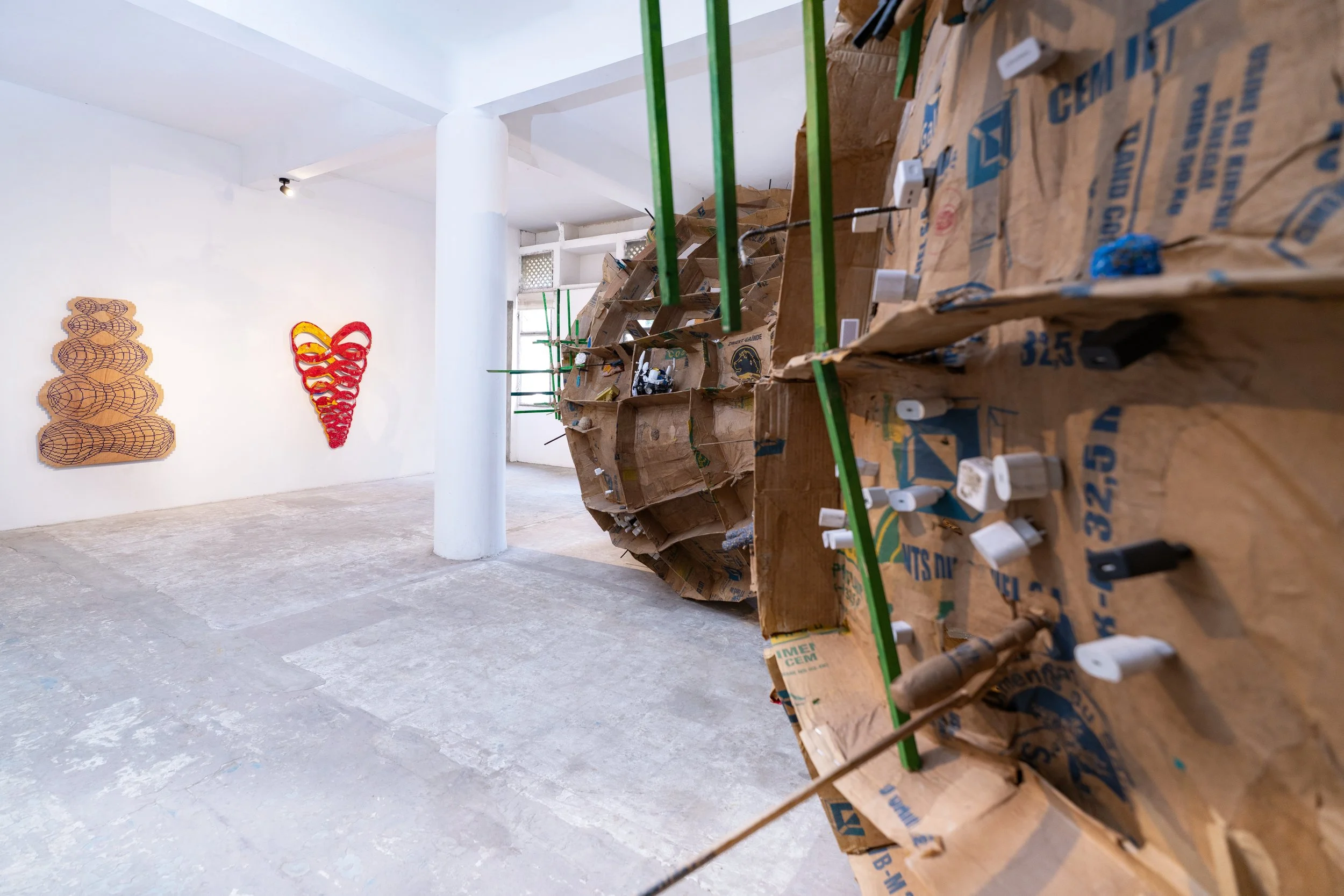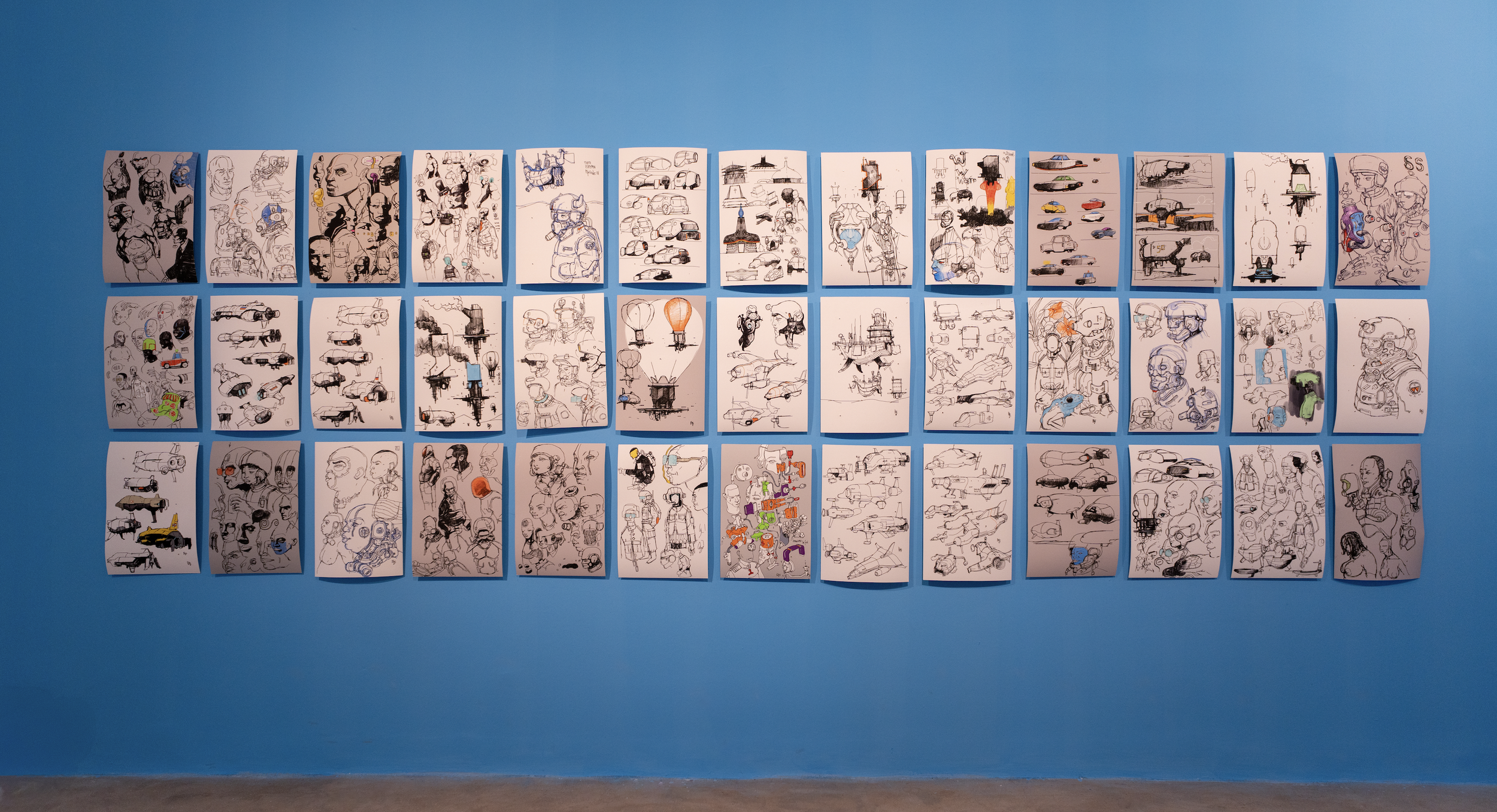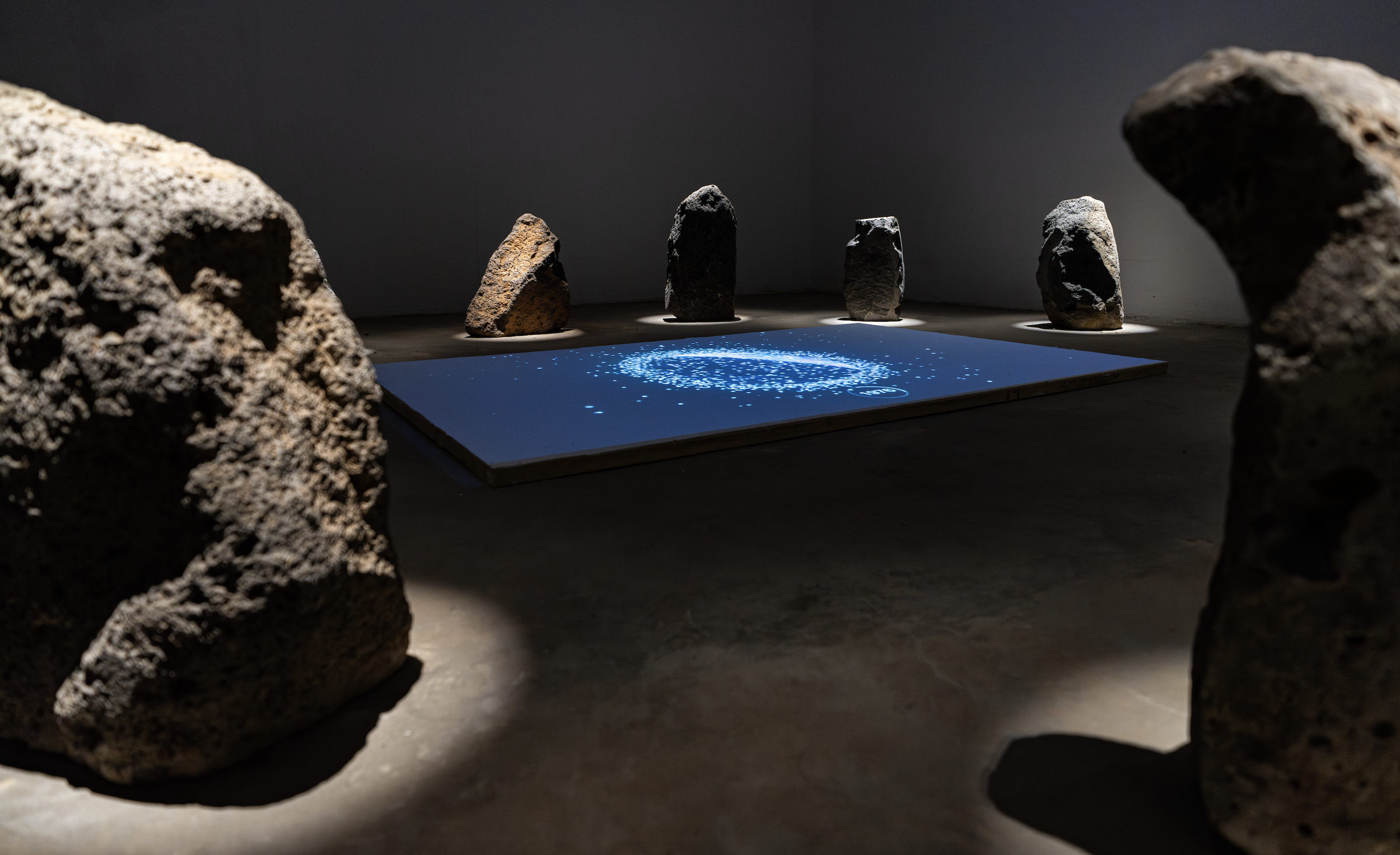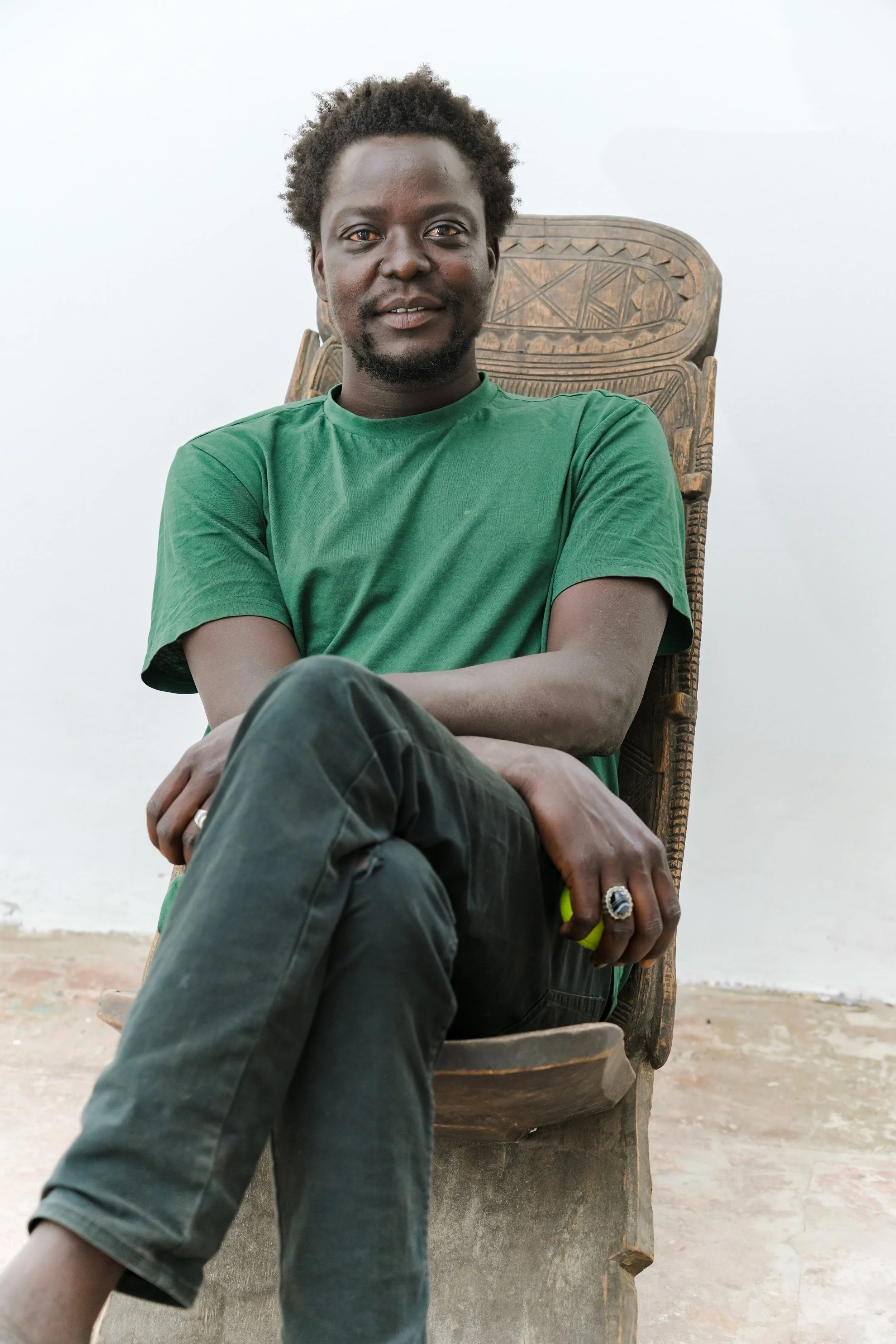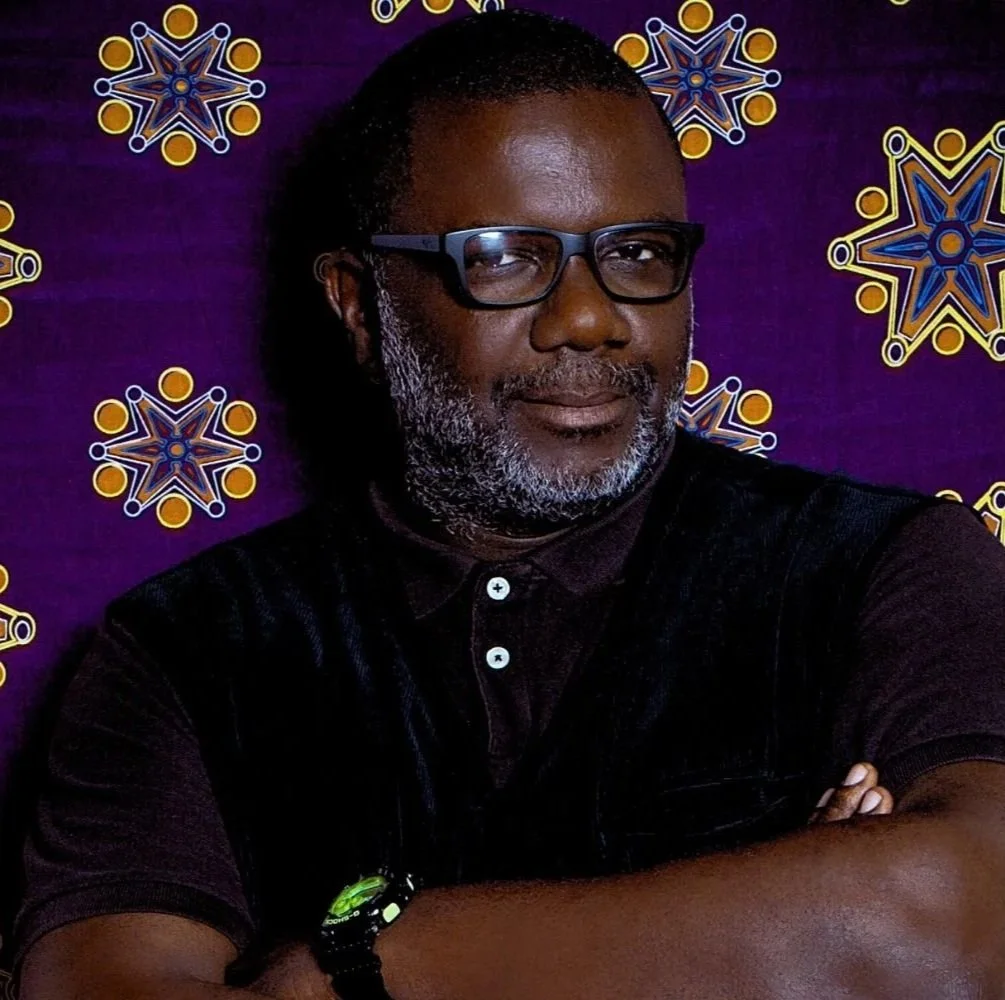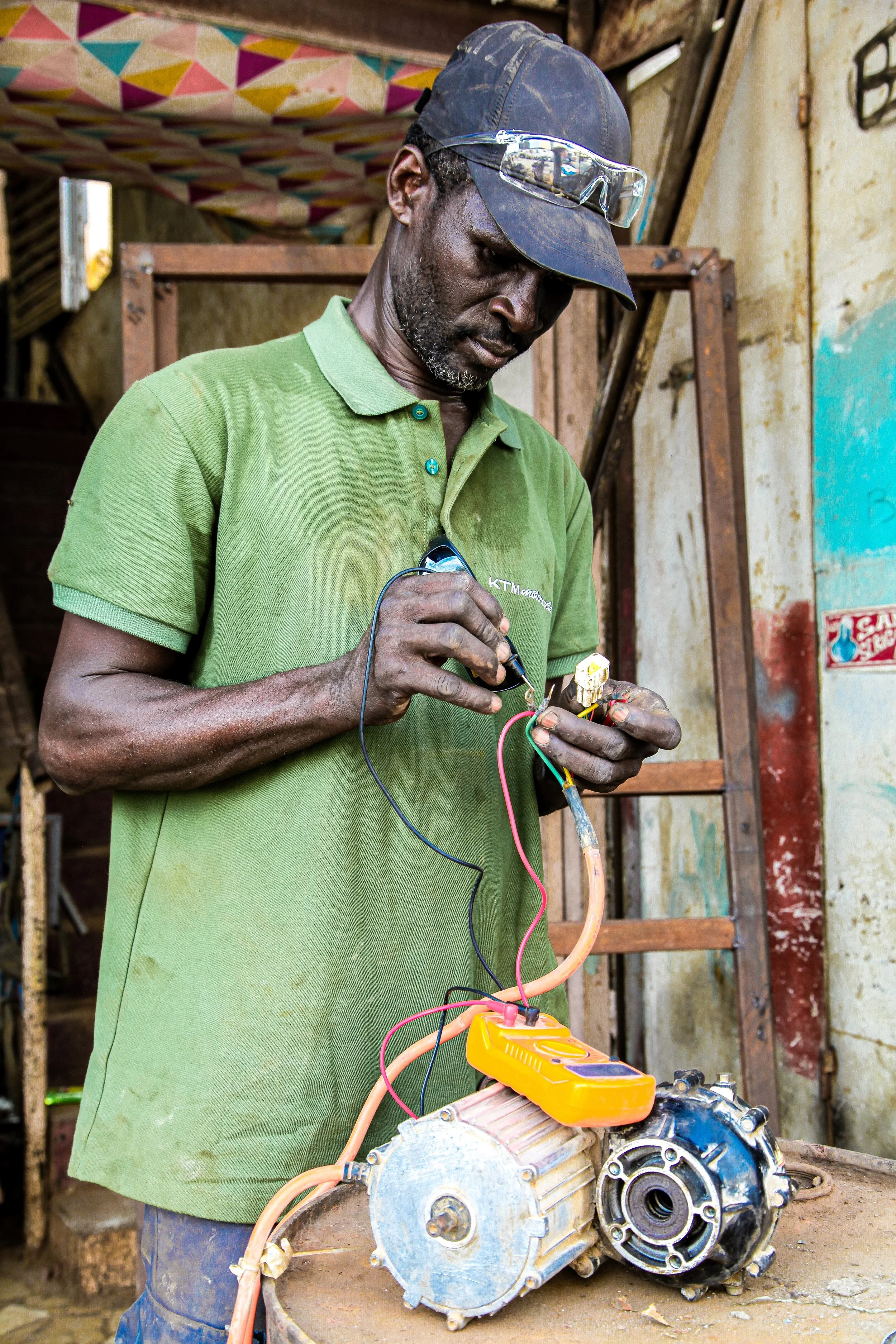IM/MOBILE
Mbaye Diop, Pap Souleye Fall, Tabita Rezaire, Bibi Seck, Bassirou Wade
IM/MOBILE
Mbaye Diop, Pap Souleye Fall, Tabita Rezaire, Bibi Seck, Bassirou Wade
November 29th 2025 - February 28th 2026
Opening on November 29th - 3-9pm
Selebe Yoon is pleased to present Im/mobile, a group exhibition with works by Mbaye Diop, Pap Souleye Fall, Tabita Rezaire, Bibi Seck, and Bassirou Wade. Between urban reality and alternative imaginaries, this exhibition explores the use of speculative fiction as a tool for reflecting on mobility: from the dynamics of movement in West African capitals and intercontinental circulation to the desire for space conquest.
From terrestrial mobility to celestial propulsion, in a leap from reality to fiction, Im/mobile highlights the tension between the reality of limited movement for some and the fantasy of mobility for others, from micro-movements within a circumscribed territory to excessive “planetarianism.” The works, made with everyday materials sourced in Senegal, revive popular imaginations and, with a certain humour and pragmatism, offer alternatives. At the intersection of design, functionality, and fantasy, Im/mobile investigates the power of fantasies to escape political and physical constraints in a world where the surveillance of human movement becomes authoritarian.
Mbaye Diop presents “Pouss Pouss” (2025), a black-and-white animated film that traces the daily journey of a street coffee vendor in the Senegalese capital. The artist sketches the journey of a character moving around with his wheeled cart, attempting to make his way through a bustling metropolis. He also presents “Espace Trépasse” (2021), a second animated film made in collaboration with Rémy Bender, which tells the story of two astronauts leaving Senegal. Similar to the fishing pirogue diverted to reach the European coast, the astronauts board a rocket-pirogue towards the sky. In a humorous style where myth and rationality coalesce, the work evokes the harshness of an economic and social context where the only act of freedom available becomes a flight into space.
Bassirou Wade, a designer based in the Niayes Thiokers neighbourhood of Dakar, transforms a motorcycle imported from China into a three-wheeled vehicle that can be converted into a boat, with the aim of making it possible for people with reduced mobility to navigate the city during the rainy season. Observing the city’s dysfunctional character, Wade develops a social design prototype, sensitive to spatial and environmental issues and capable of transforming the daily lives of a marginalised group, absent from urban policy considerations.
Pap Souleye Fall created a monumental peanut shell made from recycled materials such as cardboard and woven cans used to carry gasoline, oil and soap. Peanut monoculture, introduced to Senegal during the colonial period, played a fundamental role in the development of the country's economy, making it the world's leading exporter in the aftermath of independence. Drawing on this history of economic glory and exploited resources, Pap Souleye presents this sculpture as a ‘dead pixel’, a speculation, an absurdity at the intersection of the digital and the physical. Disconcerting in its scale, the peanut is stripped of its nature, freed from its power of historical enslavement and resembling a vessel ready to take off towards new narratives.
While working as an automotive designer at Renault, Bibi Seck conceived PAKKA CITY in the 1990s, a city suspended high above the ground where people seeking oxygen can take refuge. Through sculptures, animations, and a series of comic-style drawings, Bibi Seck conceives an aeronautical universe composed of flying cars, stations that filter polluted air, and floating vernacular architecture, in which the dysfunctions of today's cities are resolved through the most sophisticated technological inventions.
Finally, in 2019, Tabita Rezaire made the film “Mamelles Ancestrales” based on the megalithic architectures of Senegambia. A circular installation of stones surrounds the projection on the ground. Through a series of testimonies from astronomers, archaeologists, and local residents, the film addresses contemporary issues in space research, contrasting them with popular knowledge, religious beliefs, and mystical practices. It blends ancestral cosmological knowledge with scientific knowledge about the connections between heaven and earth, the world of the living and the dead.
© Text copyright: Selebe Yoon
29.11.2025-28.02.2026
Public Program
Im/mobile: counter-narratives of space conquest
A proposal by Oulimata Gueye
Dates:
Tuesday, 9 December 6pm
Introduction by Oulimata Gueye.
Oulimata Gueye is a Senegalese and French art critic and exhibition curator who teaches theory at the École des Beaux-Arts in Lyon. Her curatorial approach is based on research that combines contemporary art, literature, popular culture, and the history of science and technology.
Discussion with Tabita Rezaire & Pap Souleye Fall.
Thursday 11 December 6pm
Presentation by Joël Vacheron of his book: Cosmovisions. A visual study of the colonial foundations of space exploration, (Metis Press, 2025). Joël Vacheron has a PhD in social sciences, teaches cultural studies and is an associate researcher at ECAL and co-foundeded the Afropea Cultural Centre.
Discussion with Mbaye Diop & Bibi Seck.
Artist’s biographies
Mbaye Diop
© Morel Wichédé Sèdami Donou
Mbaye Diop is a Senegalese artist. He obtained a masters in contemporary artistic practice from the HEAD School of Geneva in Switzerland as well as at the Beaux-Arts of Dakar.
Mbaye Diop is an attentive observer of the daily urban landscapes and architectural forms of Senegal and the socio-political movements that continuously redefine the links that exist between the African continent and the West. From video, performance, drawing, to installation, the singularity of his work lies in his exclusive and almost obsessive use of black and white, allowing him to neutralise the scenes represented. His work reveals the paradigm shifts currently at play in African societies, especially the dichotomy between tradition, urban infrastructures, and new technologies that tend to transform collective life and one’s relationship to the environment. His research portrays a country that is experiencing continuous growth, where colonial architecture, decaying buildings and urban cluttering intermingle. His conception of urbanity opens the way to a true geography of sociability spaces in the city.
In 2010, he graduated from the National School of Arts in Dakar and taught visual arts in the city of Saint-Louis until 2019. He now lives and works in Switzerland and graduated with a master's degree in contemporary art practices at HEAD Geneva (Haute école d'art et de design) in 2022. He received the UEMOA prize for the Dakar Biennale in 2022; and the URTI/UNESCO prize for his radio project “Maam Kumba Bang“ in 2023. He has also been nominated for the Norval Sovereign African Art Prize in Cape Town, South Africa in 2023.
Pap Souleye Fall
© Pap Souleye Fall
Pap Souleye Fall is a Senegalese-American artist who explores the transmedia potential between mediums including sculpture, installation, performance, cosplay, digital media, and comics. Growing up within the African Diaspora, Fall defines their approach as non-Western-centered, creating immersive environments that are joyful and evoke the Black imaginary.
Their work is produced within the context of the African Diaspora. Being of two worlds and cultures, Fall delights in the ability to construct their own reality between the polarities of two widespread cultures. As such, Fall became fascinated with the ways art could be embedded in everyday life, activating common materials to explore themes such as utopia, identity, notions of masculinity, Africanisms, and Afro-Futurism. Their multidisciplinary practice often explores themes of speculative fiction.
They hold an MFA in Sculpture from Yale School of Arts in New Haven, US (2022) and a BFA in Fine Arts from The University of the Arts in Philadelphia, US (2017). They have participated in numerous exhibitions including at ICA Maine, Maine, US (2025), Jack Barrett Gallery, New York, US (2025), Blade Study, New York, US (2025), Black Rock’s Residents Exhibition ”Encounters”, at Centre Blaise Senghor, Dakar, Senegal (2024), at Yale Art Gallery, New Haven US (2022), at the Yale Afro Centre, New Haven, US (2022), at Raw Material Company, Dakar, Senegal (2022).
Tabita Rezaire
© Studio Tabita Rezaire
Tabita Rezaire has developed a multidisciplinary practice that explores the links between science, spirituality and new technologies. Her approach combines metaphysical and political perspectives to offer us new ways of understanding the world. Embracing digital, corporeal and ancestral memory, she digs into scientific imaginaries and mystical realms to tackle the colonial wounds and energetic misalignments that affect the songs of our body-mind-spirits. Tabita’s work is rooted in time-spaces where technology and spirituality merge as fertile ground to nourish visions for connection and emancipation. Through screen interfaces and healing circles, her offerings aim to nurture our collective growth and expand our capacity for togetherness.
Tabita Rezaire is based in French Guiana, where she is caring for AMAKABA; a center for the arts of earth, body and sky. Tabita Rezaire’s works have been displayed at the Centre Pompidou, Paris; Palais de Tokyo, Paris; TBA, Madrid; Serpentine Gallery, London; MASP, São Paulo; MoMa, New York; New Museum, New York; Gropius Bau, Berlin; MAXXI Museum, Rome;; Museum of Contemporary Art, Chicago; Museo d'Arte Contemporanea Donnaregina, Naples; ICA, London; V&A, London; National Gallery Denmark; The Broad, Los Angeles; MoCADA, New York; Tate Modern, London; Musée d’art moderne, Paris. She has taken part in several international biennials (Havana, Gwangju, Sydney, Shanghai, Athens, Vienna, Kochi, Berlin), the Guangzhou Triennial and Performa, New York.
Bibi Seck
© Omar Victor Diop
Bibi Seck, born Ibrahima André Seck, is a Senegalese multidisciplinary designer and artist based in Dakar. He began drawing at a very young age, and after studying automotive design in Paris at CREAPOLE-ESDI, he began his career at Renault, where he spent fourteen years designing car interiors for models such as the Scénic and Trafic. While working as an automotive designer at Renault, in the 1990s he imagined PAKKA CITY, a world suspended at an altitude of over 3,000 metres where the atmosphere is contaminated by a virus. In 2004, he founded the Birsel + Seck studio in New York with Ayse Birsel, combining automotive design and social reflection for international clients.
His work is characterised by the presence of organic forms, humour and diverse artistic references. From 2006 onwards, he gradually reconnected with Dakar, where he eventually settled. There, he developed a new design practice involving Senegalese artisans and local materials. His ”Madame Dakar” sofa, made using traditional Senegalese weaving techniques for Moroso, was voted one of the 25 most influential pieces of furniture of the century by the New York Times.
In his approach to design, he talks about ‘problem solving’ and not just style. In recent years, he has been promoting West African craftsmanship and championing the idea of democratised design. He currently runs the Quatorze Zéro Huit workshop and gallery in the centre of Dakar.
Bassirou Wade
© Aicha Tamsir Niane
Bassirou Wade, known as Bass, attended primary school in Dakar, where he began an apprenticeship at a very early age in metalworking, carpentry, upholstery and mechanics workshops. He started his own business, Bass Design, in Niayes Thiokers, specialising in the arts and in converting motorcycles for people with reduced mobility.
He has been a member of the AGIT'ART collective since 2016. Selected for the Saint-Etienne International Design Biennial, Bassirou began collaborating with Fabrice Monteiro on the creation of Afro Poly. He has participated in numerous exhibitions and festivals, such as the “Wave” exhibition at the Théodore Monod Museum in Dakar (2015), “Grafikama” in Nantes (2016), “La Cloche des Fourmis” at the Dakar Biennale (2018), “Keur Design #2” at the Manège Gallery in Dakar (2019) and the “Indaba” festival in Cape Town in 2017. He has created numerous art installations in collaboration with Maksaens Denis (Vivi Le Robot 2011, The Past, the Present, The Future, 2017), Selly Raby-Kane (Alien Cartoon, 2014), Emmanuel Louisgrand (Jardin Jet d'eau, 2014 – 2022 Exhibition La Serre Biennale Internationale du Design St Etienne), Fabrice Monteiro (Afropoly, 2016), Alexis Peskine (Raft of Meduse, 2016), Leila Adjovi, Dakar Biennale Prize, 2018).
